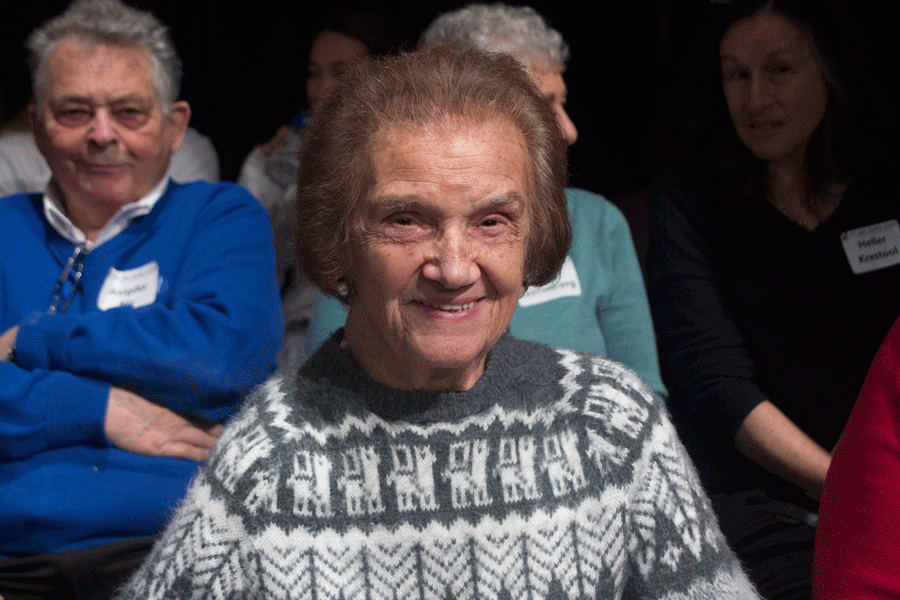Bluma Shapiro
Bluma Shapiro, a survivor of the Holocaust, “never blamed God for what happened.” Over 60 years after the Holocaust, Shapiro continues to relive and tell her story at the JC Holocaust Remembrance Day for students.
Shapiro’s story began in Bialystok, Poland in 1939, when she was approximately 20 years old. This was the year that Germany first occupied the town. At first, Shapiro thought nothing of the occupation. She was fond of the Germans, who had freed her town from cruel Russian occupation during World War I. Then came the ghetto.
Despite the large amount of pain and suffering she saw in the ghetto, her eyes light up as she tells students about the job she was able to get as a secretary for Otto Busse, a German man. The job was outside the ghetto and her parents originally did not want her to take the job because they thought it was safer inside. Shapiro is thankful that Busse, who had power because he was German, overruled her parents.
Shapiro was treated well by Busse. He did not make her wear the Star of David and hid the fact that she was Jewish from friends and business associates. “People would ask ‘where did you get such a beautiful girl?’ He would say, ‘from Prussia,’” Shapiro says. She laughs at this memory. Thinking of Busse, Shapiro tells students, “Don’t discriminate and don’t generalize. Not all Germans [were] evil.”
In 1943, Shapiro was sent to the Blizyn Labor camp, where she sewed buttons on uniforms. The quota changed each day and was never announced. “If people did not fulfill the quota, they were lashed. Many did not get up,” Shapiro says.
Eventually, she was transferred to the Auschwitz concentration camp. Shapiro pulls up her sleeve and shows Kate Runser and I the number she was tattooed with upon arrival, “A15215.” The black numbers span about two inches on the inside of her lower arm, still legible.
Shapiro speaks frequently about the many miracles that occurred for her at the concentration camp, such as the barrack leader who provided her with hot water during the winter nights to warm her hands with and to drink. Shapiro fondly tells students that this salty water tasted better than the finest of wines.
Her first job at Auschwitz was digging holes in surrounding fields for bombs. One day, Shapiro was extremely exhausted so she told her fellow digger, “I’ll sit down for a few minutes;” to which her friend responded “Don’t you dare.” Before Shapiro had even sat down, a German Shepherd was upon her. The dog managed to snag her shoe, but her body miraculously remained unharmed.
Shapiro looks upwards towards heaven as she tells students, “I was meant to survive.”
Eventually the news came that Russians were near the camp. The prisoners had two options: go on a death march to a new camp or stay and risk extermination before the Russians arrive.
Shapiro left Auschwitz on the death march on Jan. 18. The Russians liberated the concentration camp on Jan. 21. “We didn’t believe the German’s would leave all the people living in Auschwitz when the Russians came, but they didn’t have time,” Shapiro says.
She traveled to several different camps, before being liberated on May 2, 1945. She laughs while telling students about how the Russians didn’t believe a 20-year-old girl could survive the Holocaust while many others died. They thought she must have allied with the Germans, but to prove them wrong, she took off her dress, and “it walked by itself. That’s how much lice it had.” I find it hard to believe she recounted this story with a smile.
Later in the day, Shapiro eventually comes around to telling students about the sorrowful part of her liberation. The survivors that were rescued by Americans were given food in small increments to let their bodies slowly adjust, but according to Shapiro, “Russians gave as much food as [the survivors] want.” Survivors liberated by Russians frequently gorged themselves and died from overeating.
Shapiro’s voice breaks as she says, “There were four girls who had stuck together from my hometown. One of them died from overeating. We had to leave her behind.”
Shapiro pauses for a long time after this. The only other time during the day when I saw her this sad was when she discussed her family. “The worst part was when I was liberated, and I found out none of my family had survived,” Shapiro says.
Despite her deep sorrow, Shapiro has decided not to hate the Germans. “I made up my mind not to hate. Hate destroys the hater,” Shapiro says. She tells students to erase the word “hate” from our vocabulary.
For a long while, Shapiro kept her story a secret from everyone, even her husband who was also a Holocaust survivor. In 1979, she saw a newspaper article about a college professor teaching his students that the Holocaust never happened. She frowns at the memory. “I thought it was a bad dream, so I started talking.”
Kelly Foulk is a News Editor for The Patriot and jcpatriot.com.

